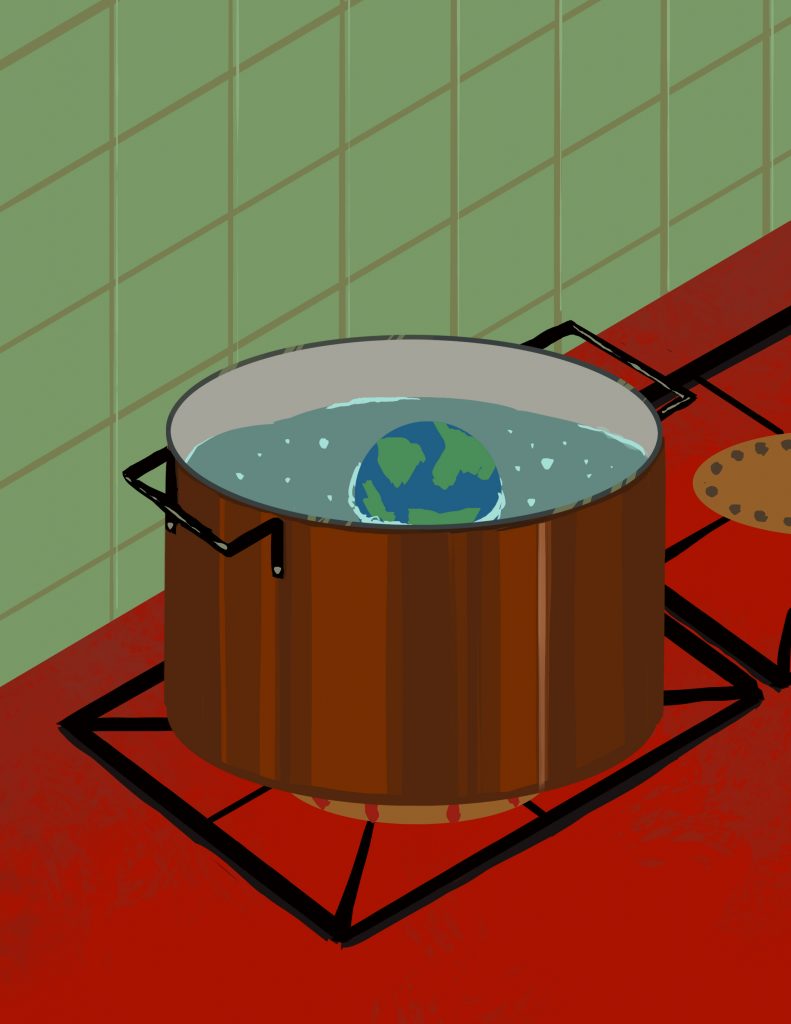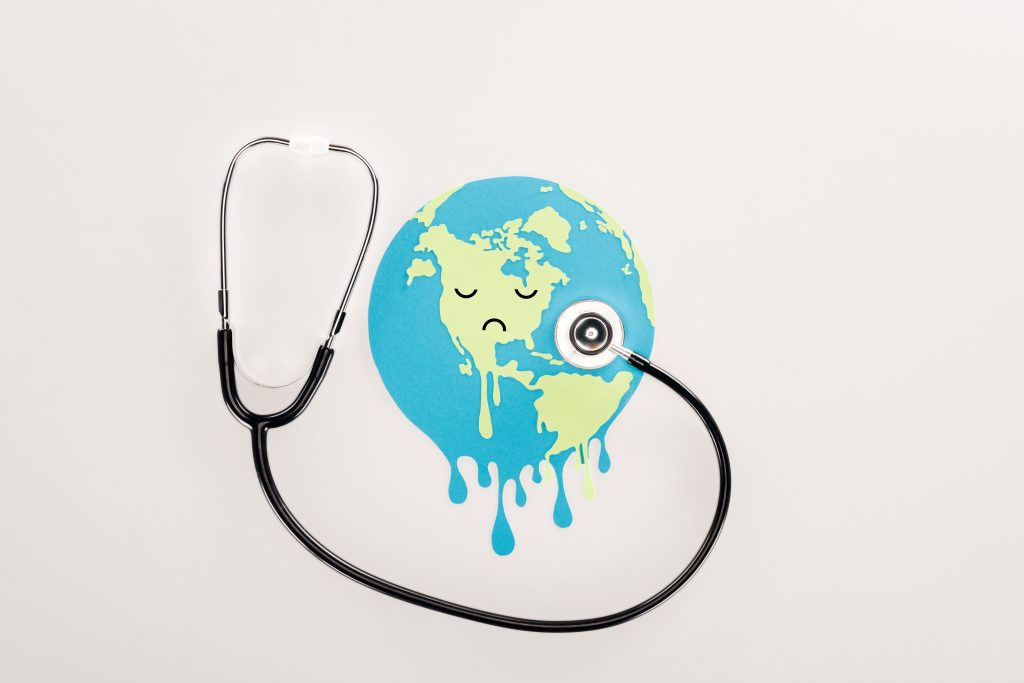It is no secret that the Earth’s climate is changing. It has been changing since it came into existence due to natural factors like the sun’s energy, volcanic eruptions, etc. Now, however, it is also changing as a result of human activities. Climate change is the inevitable consequence of greenhouse gas emissions, deforestation, pollution, and a rapidly increasing population. Although one individual cannot cause these global impacts, humanity as a whole is the reason for climate change. After all, we are the ones who need water, heat, electricity. For us, fossil fuels are burned, producing billions of metric tons of carbon dioxide and other greenhouse gases. Trees are cut down to make room for humans, also contributing to climate change. Greenhouse gases like carbon dioxide trap heat in the atmosphere, causing the globe to heat up. These harmful human activities, among others, lead to fluctuations in weather. Contrary to the belief of many, climate change is not a myth. It is a human-created problem, and the impacts of climate change will be endured by humans. We are already experiencing these impacts, and they will get worse in the future. The truth is, we are ruining the planet for ourselves and future generations.

Global warming is one of the effects of climate change. The Earth’s temperatures have been rising for years due to human activities like our use of fossil fuels, which release carbon dioxide. Greenhouse gases like carbon dioxide and methane accumulate in the atmosphere, causing the Earth to heat up. Over the last century, temperatures have increased by about 0.7 degrees celsius, and they will continue to increase. Data from The National Oceanic and Atmospheric Administration showed that 2016 had the highest recorded temperatures, and 2020 was the second warmest year. According to a special report by the Intergovernmental Panel on Climate Change, or the IPCC, if temperatures surpass 1.6 degrees Celsius above pre-industrial levels, the warming will be extreme and will affect humans and the Earth in many different ways. We will experience extreme weather conditions like heatwaves. In fact, the IPCC report found that if temperatures exceed 1.5 degrees celsius, around 14% of the Earth’s population will experience intense heat waves at least once in 5 years. Currently, global temperatures are about 1 degrees Celsius above pre-industrial levels, and we are already experiencing heat waves. The recent heatwaves in the Pacific Northwest are an example. Temperatures reached above 40 degrees celsius, causing heat-related illnesses and more than 1000 casualties. Rises in temperatures will also cause an increase in droughts, precipitation, forest fires and much more. Different regions will experience different impacts, and some people will be affected more than others. That being said, increasing temperatures are a global problem, and it is a critical issue.
Global warming is causing other problems‒ a very prominent one is the increase in global sea levels. Sea levels are rising due to melting ice caps and glaciers and the expansion of ocean volume, which are the results of the changing global climate. According to the National Oceanic and Atmospheric Organisation’s website, climate.gov, from 1993 to 2019, sea levels have risen as much as 6-8 inches in some places. Levels rose about 0.24 inches from 2018-2019 alone. This means that global sea levels are rapidly rising as a result of a warming planet, and they will continue to rise unless global carbon emissions are drastically reduced. Furthermore, if sea levels do continue to rise, humans and our homes will be at risk. Many places will experience dangerous flooding, including and especially in underdeveloped countries. However, major cities will also be affected. New York, for example, is located on an island, which means that many parts of the area will be underwater if a large amount of flooding occurs. Flooding is likely, as a 4.5-inch rise in sea level is to be expected by 2030 (National Geographic). Other megacities like Mumbai and Tokyo, which are located in coastal areas, are in danger of flooding in the near future. Sea level rise does and will affect millions of people, ruining their homes and even causing a multitude of other problems like water-borne illnesses and dangerous storms. These are the realistic results of climate change and sea-level rise.
Higher temperatures, colder temperatures, floods, and droughts will definitely impact humans, as we are residents of this planet. But the diverse fauna of this planet will also endure the effects of climate change. Deforestation, a huge cause of climate change, is heavily affecting animals. It is destroying their habitats. According to the 2019 IPCC special report, deforestation will only increase if temperatures increase by 1.5 to 2 degrees celsius. Moreover, as temperatures increase, forest fires will become prevalent. Increased temperatures are harmful to many species, including arctic animals. Polar bears, for example, are in danger of extinction due to melting sea ice. A Nature Climate Change study predicts that polar bears could be extinct by the year 2100. A spike in precipitation will also harm animals who are suited to dryer environments. Unfavourable habitats caused by climate change will force some animals to migrate, in search of more survivable conditions. However, migration is not always possible, and a lot of animals cannot adapt to our changing climate. Many species of plants and animals will go extinct, and it is estimated that almost 8% of species extinction will be due to climate change, according to a 2015 study by the University of Connecticut. Many underwater and oceanic species are also endangered due to sea-level rise and the acidification of oceans, which is caused by the burning of fossil fuels. This means that while humans and human habitats are in serious danger due to climate change, so are animals and their habitats.

Climate change is a huge global crisis that is getting increasingly severe. We are already experiencing its impacts in the form of heatwaves, droughts, floods, and extreme weather conditions. However, these are only a few of the effects. Humans will soon experience even more severe conditions as the Earth becomes warmer. We know the causes of this crisis‒greenhouse gas emissions, pollution, deforestation‒are human activities. But we also know the solutions. We know what we must do to help our planet or at least prevent the irreversible effects that we are headed towards. Though one person cannot fix this global crisis, every small effort makes a difference. Not just switching to no-waste products and recycling, but making sure that our leaders are working to improve the climate crisis. We only have one planet‒we owe it to ourselves and all present and future generations, to save it.
Special thanks to Northeast Ohio Regional Sewer District
Connect with Northeast Ohio Regional Sewer District on social media
- https://twitter.com/neorsd
- https://www.facebook.com/yoursewerdistrict
- https://www.youtube.com/user/neorsdccr
- https://www.instagram.com/neorsd/
- https://www.pinterest.com/wallywaterdrop/
- Understanding Watersheds – Northeast Ohio Regional Sewer District (neorsd.org)
Bibliography
- Borunda, Alejandra. (November 2019). Sea level will rise for centuries. We can control how much and how fast. National Geographic. https://www.nationalgeographic.com/science/article/paris-agreement-period-still-leads-to-sea-level-rise
- Buis, Alan. (June 2019). A Degree of Concern: Why Global Temperatures Matter. Nasa Global Climate Change. https://climate.nasa.gov/news/2865/a-degree-of-concern-why-global-temperatures-matter/
- Hausfather, Zeke. (September 2019). Explainer: How climate change is accelerating sea level rise. Carbon Brief. https://www.carbonbrief.org/explainer-how-climate-change-is-accelerating-sea-level-rise
- Hoffman, Ary. Climate change and biodiversity. Australian Academy of Science. https://www.science.org.au/curious/earth-environment/climate-change-and-biodiversity#:~:text=Healthy%20ecosystems%20and%20rich%20biodiversity,a%20significant%20effect%20upon%20ecosystems
- Hugonnet, R., McNabb, R., Berthier, E. et al. Accelerated global glacier mass loss in the early twenty-first century. Nature 592, 726–731 (2021). https://doi.org/10.1038/s41586-021-03436-z
- Introcaso, David. (December 2018). Climate Change Is The Greatest Threat To Huma Health In History. Health Affairs Blog. https://www.healthaffairs.org/do/10.1377/hblog20181218.278288/full/
- Konyn, Carol. (July 2020). Polar Bears Heading for Extinction by 2100- Study. Earth.org.
- Lindsey, Rebecca. (January 2021).Climate Change: Global Sea Level. Climate.gov. https://www.climate.gov/news-features/understanding-climate/climate-change-global-sea-level#:~:text=Based%20on%20their%20new%20scenarios,above%202000%20level%20by%202100.
- May, Sandra. (Aug, 2017). What is climate change? NASA. https://www.nasa.gov/audience/forstudents/k-4/stories/nasa-knows/what-is-climate-change-k4.html
- Molnár, P.K., Bitz, C.M., Holland, M.M. et al. Fasting season length sets temporal limits for global polar bear persistence. Nat. Clim. Chang. 10, 732–738 (2020). https://doi.org/10.1038/s41558-020-0818-
- NOAA. (February 2021). Is Sea Level Rising? National Ocean Service. https://oceanservice.noaa.gov/facts/sealevel.html
- Osborn, Lis. History of Changes in the Earth’s Temperature. Current Results. https://www.currentresults.com/Environment-Facts/changes-in-earth-temperature.php
- Tollefson, Jef. (April 2020). How hot will Earth get by 2100? Nature. https://www.nature.com/articles/d41586-020-01125-x
- Unknown. (February 2018). Climate change and health. World Health Organization https://www.who.int/news-room/fact-sheets/detail/climate-change-and-health
- Unknown. (January 2021). 2020 Tied for Warmest Year on Record, NASA Analysis Shows. NASA Global Climate Change. https://climate.nasa.gov/news/3061/2020-tied-for-warmest-year-on-record-nasa-analysis-shows/
- Urban, Mark C. (May 2015). Accelerating extinction risk from climate change. Science Journal. http://science.sciencemag.org/content/348/6234/571.full























